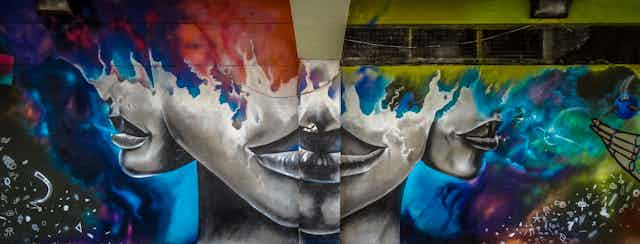What does it mean to assume the mantle of another language?
Literary translations can sometimes appear to mask this question. I’ve read many books in which the work of a translator is acknowledged only in the most discreet and parenthetical terms, disclosed in a brief inscription on the title page without any further explication.
Perhaps it’s thought that the existence of an original text and its glaring otherness might somehow unnerve us as readers; that we’re bound to worry about what’s been lost or transfigured in the process of a linguistic approximation.
The sense that there are insurmountable gaps between languages isn’t just a concern for readers. It’s also an obsession for writers, who, when translated, must face the prospect of relinquishing control over their own words. After Susan Sontag wrote The Volcano Lover (1992), she claimed to have checked, sentence by sentence, its translation in four different languages.
The labour of translation is often described as a sort of punishing and quixotic enterprise. In her essay, A Translator’s Monologue, Cynthia Ozick speaks of the need for the translator to adopt a false belief in his or her capacity to deliver the original text utterly intact and unadulterated. Otherwise, she writes, “you will be in possession only of a fuzzy shadow and a cracked mirror”.
Which is always, to some extent, what you will end up with anyway.

Jhumpa Lahiri’s recent memoir, In Other Words (2016), promotes an alternative response to the opacity of foreign tongues. By her account, difference is something to neither to conceal nor circumvent; it’s a source of ecstatic wonder.
The memoir – a work of remarkable literary daring – loosely follows Lahiri’s quest to learn Italian and her relocation from Brooklyn to Rome. Lahiri sacrifices her precise, award winning skill with English to write entirely, fumblingly, in Italian.
This isn’t a traditional chronological account of her physical voyage. She’s far more interested in contemplating the act of writing itself, and specifically, her artistic desire to abscond from one language and find refuge in another.
Lahiri has never been a writer with a readily defined mother tongue. Reflecting on her childhood as the daughter of Indian emigrants to the United States, she recalls never feeling entirely at ease with either English or Bengali, having to constantly negotiate between the two.
“I know that my writing in Italian is something premature, reckless, always approximate,” she confesses. “I’d like to apologize. I’d like to explain the source of this impulse of mine.”
Here I’m not directly quoting the author, but more accurately, Ann Goldstein’s interpretation of her words into English. The original Italian prose is presented adjacent to its translation. The separation between the two becomes part of the aesthetic experience of reading.
The language is plainly advertised as mediated and indeterminate, first because of Lahiri’s provisional grasp of Italian, and then through the baldly displayed intervention of her translator.
Such disclosures of uncertainty correspond with Lahiri’s descriptions of linguistic infatuation. She fell in love with Italian before she could even understand it; it struck her as immediately familiar in spite of its impenetrable meaning.
In fact, the strangeness of the language is inextricable from its appeal. “If it were possible,” she muses, “to bridge the distance between me and Italian, I would stop writing in that language.”
This longing for imperfection means that the author effectively disavows her own poise. The fragility of her literacy may even be integral to the book’s stylistic character.
This isn’t to suggest that the prose is deficient. One can, however, detect a slightly constrained quality in its laconic sentences; the absence of rhetorical excess suggests a sense of nakedness.
All of this is complicated by the memoir’s status as a translation. I have no knowledge of Italian, and consequently, no ability to tell if the style I’m describing is indebted to the author’s professed limitations in that language. It might also be a by-product of Italian’s manipulation into English.
My encounter with In Other Words therefore hinges on a contradiction. Words that appear in their most basic form are also fraught with ambiguity. The familiar emerges as profoundly remote, a paradox echoed in the author’s explanation of her attraction to Italian in the first place.
These complexities draw attention to the powerful but tentative nature of all language. The rendering of consciousness and memory that it confers is neither neutral nor transparent. It offers us revelation only through the lens of the figurative. As Lahiri writes,
Language is the mirror, the principal metaphor. Because ultimately the meaning of a word, like that of a person, is boundless, ineffable.
The author’s relationship to language is deeply embedded with feelings of estrangement and elusiveness. Her recent path towards Italian is a continuation of that patterning. It reflects the journey of a writer without a home.

